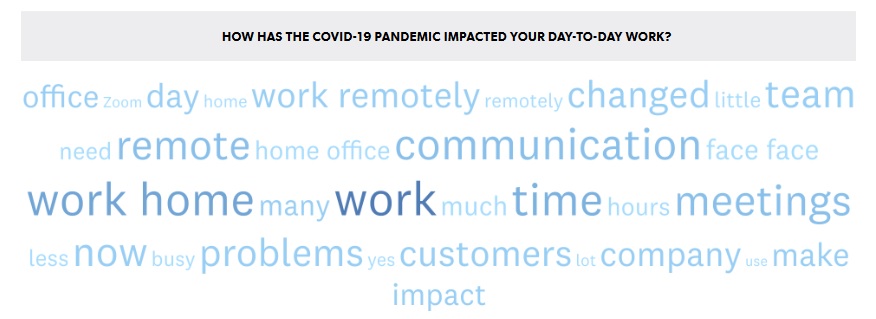GitLab announced the general availability of GitLab Duo with Amazon Q.
The COVID-19 pandemic has been a disruptive event for development teams and companies alike, unsurprisingly, according to a recent survey of developers across the world by JRebel by Perforce.
Developers were asked to share the impact COVID-19 has had on themselves, their teams, and their companies. Respondents report working longer hours from home, struggling to maintain good work habits, and eating more comfort food to cope.
On a more positive note, many respondents are spending more time with families or in nature, and reporting even simple things such as noise-cancellation headphones making home-based working easier.

Impact on Hours
91% of developers report that they are working from home (and as early adopters of new ways of working, many developers have already been successfully working from home for years.)
While only 17% reported a drastic impact on their work since the pandemic (with over half of respondents saying that the impact had been moderate), 58% said that they've experienced an increase in hours per week.
While the most-reported increase was between zero and three hours, over 19% reported an increase of over 6 hours per week. It also means that roughly 2% of respondents reported a 6+ hour increase but did not consider that to be a drastic impact on their work.
For developers already putting in long hours pre-COVID, that marks a substantial increase, even a small percentage increase has big implications for busy teams. That said, anecdotal evidence from some survey respondents found that some of the extra time goes into checking "just one more email."
Nearly 56% of companies decreased or froze hiring, 33% decreased contractors
The survey found nearly 56% of companies decreased or stopped hiring during the COVID-19 pandemic, and 33% reported a decrease in the number of staffed contractors. However, that the figures are not higher is a positive surprise: indeed, that over a third report no change in hiring patterns, and almost 60% no changes in contracting.
Key Takeaways
That remote work will remain prominent is no longer news, with more companies expected to embrace decentralized autonomous and fully remote teams for the longer-term.
Reduced overhead and increased pace of innovation will continue to be important points of change for organizations, and the pandemic has been the catalyst for new working models.
Virtual communications is fast becoming the new-norm, together with a shift away from permanent office space to "hoteling" options.
For instance, development teams have been trending smaller for some time now, but COVID-19 has clearly shown the importance of having small, agile teams.
Also, widespread access to new cloud, open source, VR, and AI technologies will mean smaller teams can compete side by side with much larger organizations.
2020 has been tough, with organizations of all kinds having to accelerate digital transformation and rapidly reinvent how they operate. Getting the foundations in place now for a more flexible modern workplace puts the IT community in good shape to adapt and deal with pandemics and other unforeseen challenges.
Industry News
Perforce Software and Liquibase announced a strategic partnership to enhance secure and compliant database change management for DevOps teams.
Spacelift announced the launch of Saturnhead AI — an enterprise-grade AI assistant that slashes DevOps troubleshooting time by transforming complex infrastructure logs into clear, actionable explanations.
CodeSecure and FOSSA announced a strategic partnership and native product integration that enables organizations to eliminate security blindspots associated with both third party and open source code.
Bauplan, a Python-first serverless data platform that transforms complex infrastructure processes into a few lines of code over data lakes, announced its launch with $7.5 million in seed funding.
Perforce Software announced the launch of the Kafka Service Bundle, a new offering that provides enterprises with managed open source Apache Kafka at a fraction of the cost of traditional managed providers.
LambdaTest announced the launch of the HyperExecute MCP Server, an enhancement to its AI-native test orchestration platform, HyperExecute.
Cloudflare announced Workers VPC and Workers VPC Private Link, new solutions that enable developers to build secure, global cross-cloud applications on Cloudflare Workers.
Nutrient announced a significant expansion of its cloud-based services, as well as a series of updates to its SDK products, aimed at enhancing the developer experience by allowing developers to build, scale, and innovate with less friction.
Check Point® Software Technologies Ltd.(link is external) announced that its Infinity Platform has been named the top-ranked AI-powered cyber security platform in the 2025 Miercom Assessment.
Orca Security announced the Orca Bitbucket App, a cloud-native seamless integration for scanning Bitbucket Repositories.
The Live API for Gemini models is now in Preview, enabling developers to start building and testing more robust, scalable applications with significantly higher rate limits.
Backslash Security(link is external) announced significant adoption of the Backslash App Graph, the industry’s first dynamic digital twin for application code.
SmartBear launched API Hub for Test, a new capability within the company’s API Hub, powered by Swagger.
Akamai Technologies introduced App & API Protector Hybrid.




